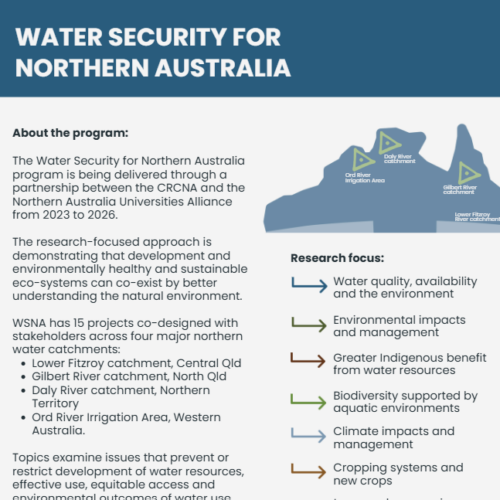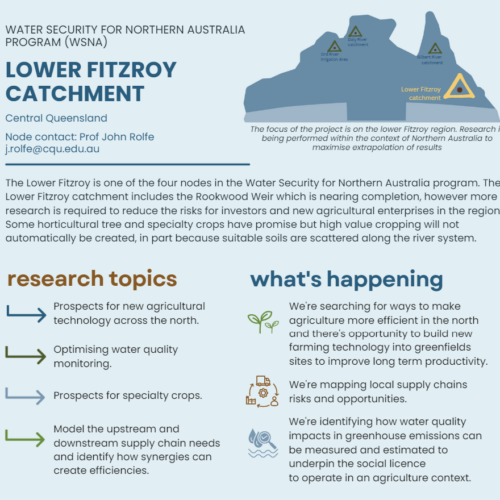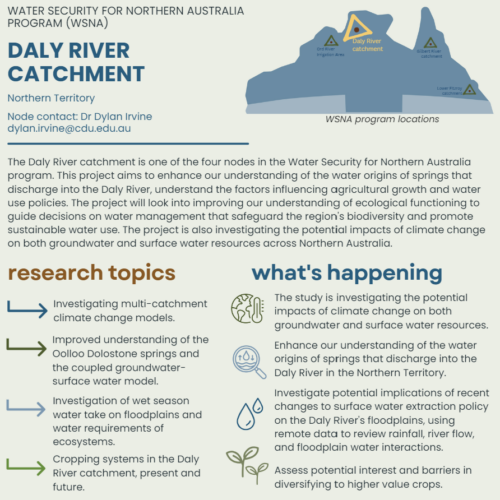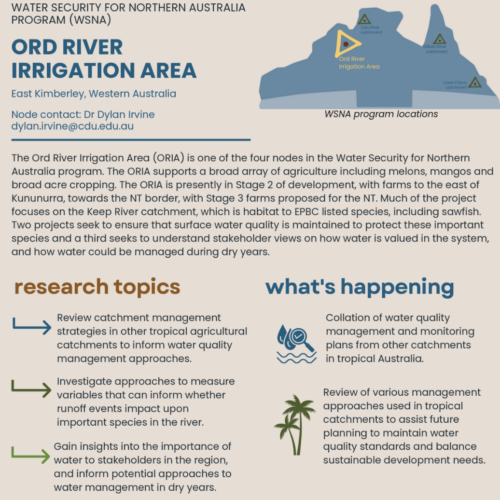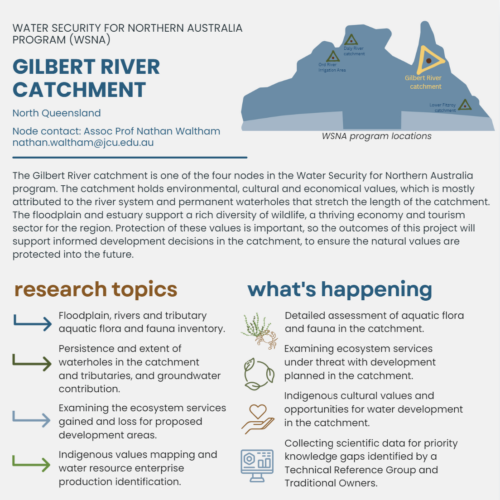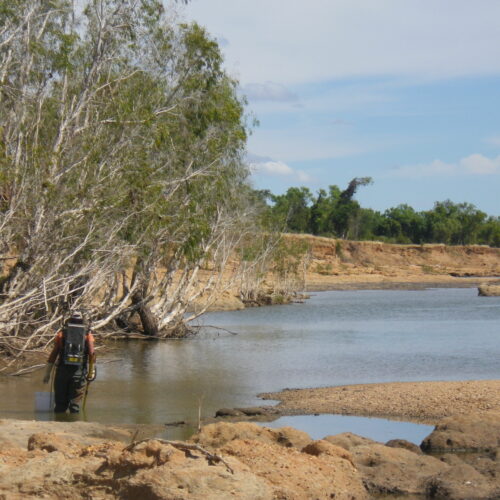
- Reference # AT.7.2223014
- Project Status Current
- Timeframe 3.5 years (2022 to June 2026)
- Project manager Anthony Curro
- CRCNA Funding $3,672,588
- Total project value $7,345,176
- Project research participant Northern Australia Universities Alliance - James Cook University (JCU) ; CQUniversity ; Charles Darwin University (CDU)
- Research Programs 7. Informing policy development
- Location Kununurra, WA, Douglas Daly, NT, Rockhampton, QLD, Georgetown QLD
- Water Security program
- Water
Summary
This Water Security for Northern Australia program has been delivered through a partnership between the CRCNA and the Northern Australia Universities Alliance.
It is intended this program will develop and implement a series of research projects which address problematic issues which are constraining sustainable water resource utilisation in four key precincts or focal nodes across Northern Australia. These focal nodes are (Gilbert (QLD), Daly-Katherine (NT), Ord (WA) and lower Fitzroy (QLD)).
These focal nodes were selected by the CRCNA based on prior assessments and consultation indicating they are likely locations of further water resource development pressure. In order to develop such a series of research projects, it was first required that the relevant stakeholders in each focal node be engaged in a co-design process.
The co-design phase of the Water Security for Northern Australia program has identified a series of 15 priorities to be further examined as part of this implementation phase of the Water Security for Northern Australia program.
Expected outcomes
Each of the project focal nodes that are the focus for this research program, have issues that prevent or restrict either development of water resources, more effective use of water resources, equitable access to water resources or environmental outcomes of water resource use. The 15 projects co-designed for this implementation phase are designed to address one or more of these issues.
It is expected, at this work will deliver:
- improved environmental outcomes, especially through improved water quality monitoring design and implementation
- faster and improved development assessment outcomes through provision of data on key resources which are implicated in contested decisions or that hold up development assessments due to insufficient knowledge
- reduced costs for environmental monitoring in development areas through improved efficiencies, re-prioritised design and/or the implementation of new technologies that reduce the cost of monitoring. Reduced monitoring costs reduce production costs for farmers
- more information for water resource managers on which to base estimates of water availability and allocation, thus improving and reducing risk in allocation decision-making
- an evaluation of the costs and benefits of water use efficiency
- an understanding why farmers are not growing higher value crops
- a greater opportunity for Indigenous groups to access or at least have a greater understanding of their options for access to, and obtaining benefit from, water resources
- improved understanding of upstream and downstream supply chain catchment needs.
Five work packages
The 15 research projects have been categorised into 5 packages of related work tasks. These are described for easier understanding of linkages between projects and overlap in project content between different geographic nodes. These are:
WP 1: Cross Northern Australia
WP 2: Water quality and the environment
WP 3: Water availability and the environment
WP 4: Cropping systems and new crops
WP 5: Supply chain and alternative economies
Outcomes
The program will provide more information to decision-makers on water resource availability and allocation, environmental impacts and management, greater economic returns from the use of water resources and greater Indigenous benefit from water resources.
An additional benefit is the capacity building of the three universities involved and all the researchers involved in the research program. The co-design and highly communicative nature of the program is building bridges between researchers and regional stakeholders and also between the various stakeholder groups themselves (e.g. government, industry, conservation, Indigenous).
This greater understanding of each other’s issues and greater personal rapport from coming together to discuss these issues will result in less contestation over water resources and improved understanding and communication between researchers, government decision-makers and relevant node stakeholders.
[project published on crcna site 10 May 2023]
Publications
8 November 2024
Factsheet: Water Security for Northern Australia program
Type: Fact sheet
Industry: Water Security program, Water
23 May 2024
Factsheet: Lower Fitzroy catchment, Water Security for Northern Australia program
Type: Fact sheet
Industry: Water Security program, Water
23 May 2024
Factsheet: Daly River catchment, Water Security for Northern Australia program
Type: Fact sheet
Industry: Water Security program, Water
23 May 2024
Factsheet: Ord River Irrigation Area, Water Security for Northern Australia program
Type: Fact sheet
Industry: Water Security program, Water
23 May 2024
Factsheet: Gilbert catchment, Water Security for Northern Australia program
Type: Fact sheet
Industry: Water Security program, Water


